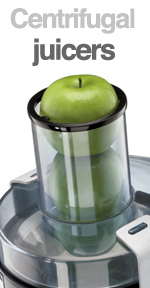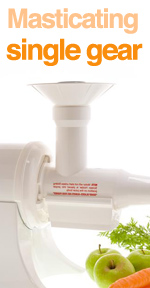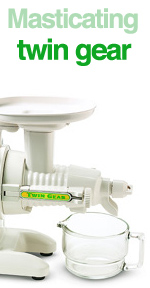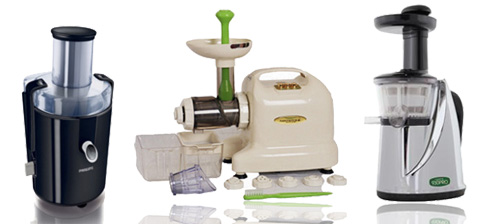
Juicing fruits and vegetables is widely considered a healthy habit, even though most nutrition experts caution against the excessive sugar and calories you get from juicing. But juicing is not for everyone. And before jumping in head first, there are a few things you should consider.
Questions you need to consider before buying a juicer
♦ What will you be juicing and will the juicer be able to juice what you want?
♦ Is it easy to use?
♦ Is it easy to clean?
♦ How effective is the juicer at juicing – will this be effective enough for you?
♦ How effective is it at preserving nutrients when it juices?
♦ Will the motor and parts last?
♦ How much do you want to spend?
Types
The type of juice maker you choose depends on the type of juice you like to drink. If you plan to make only citrus juice, then a juicer is a fine choice. But if you plan to make your own carrot or vegetable juice, then an extractor is the better choice. Here are the types of juice makers to consider.
| |
Centrifugal Juicers: Owned by 90% of "juicy people" The higher end centrifugal juicers are owned by most people because of their speed and efficiency. You can juice fast, clean it up fast and the good ones extract a lot of juice from the produce. These high speed juicers work with centrifugal force to extract the juice. The fruits and vegetables are pushed down a feed tube (mostly whole so no chopping is required) on to a serrated cutting blade on the bottom of a rapidly spinning basket at around 12000 RPM. This spinning cutter, slices the veg and fruit, and the pulp is flung into the pulp extractor. Perfect for people that are time poor but want to make juice every day. |
| |
Masticating "Single Gear" Juicers: "For People seeking Quality Juice" Known as slow speed juicers, these are an excellent choice for juicing a wide ranges of veg, fruit and in most cases wheatgrass. With a RPM of only 70RPM to 160RPM it reduces the oxidation of the juice and allows juice to be made and then kept for anything up to 48 hours. Although a more expensive option, they usually come with extras allowing the user to make smoothies, purees and ice creams. Cleaning is still reasonably quick and easy like a centrifugal juicer and on most occassions just requires rinsing. The quality of the juice from a masticating juicer is known to be of better quality (due to the slower process) and generally produces a higher yeild over centrifugal juicers.A perfect choice for those looking for a excellent quality juice. |
| |
Masticating "twin-gear" Juicers: "For Serious Juice Professionals" These are the most efficient juicers available. They produce juice by squeezing produce between two stainless steel cylindrical rollers that sit side by side. The produce is pulverised by sharp teeth as its fed through the machine. The produce is pressed, squeezed and extracted more effectively than any other type of juicer and at a much lower temperature. These really are the best you can get. They make light work of even the most stubbon veg and an excellent choice for any serious juicer.
|
Features
Look for juice-maker features that make the machines easier to use, store and clean. Also make sure that the juicer accommodates the type of fruit or vegetable you wish to use without a lot of prep work. Here are the juicemaker features to consider.
| | ||
| Clear juice container Cord storage Dishwasher safe Dust cover |
| Protects the opening of the chute where you insert produce for juicing. Large chute Long cord Pulp regulator |
Brands
There are some familiar players in the juice-maker market, including one brand, Cuisinart, that offers a juicer as an accessory to its other products. Use these profiles to compare juice makers by brand.

Written by Nicolas Yang









